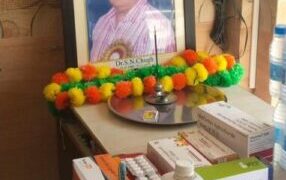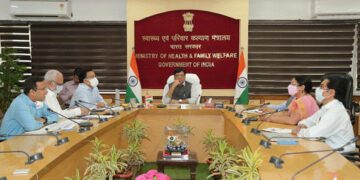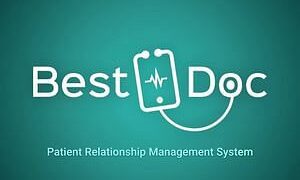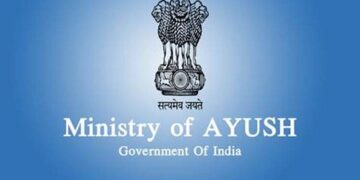By Vivek Srivastava
India is a country with long stretches of highways and roads interconnecting far flung interiors with the buzzing cities and metros. Fleets of trucks run on these highways and roads to deliver diverse goods including clothes, farm produce, construction materials and hazardous substances to name a few to their destination. However, the well-being of truckers and their support staff is neglected as they move from one place to another while spending demanding hours on the road.
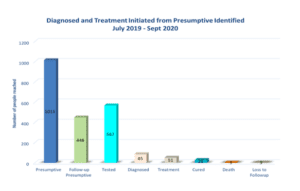
With 6 million trucks in India, the trucking industry represents a notable 2.5% of the most economically productive labour force. The truckers often hail from poor families and lead socially marginalized life with majority of them being school dropouts. Besides, most of the truckers work as bonded labourers for more than 15 hours a day on the road away from their family affecting their health and quality of life. Often, they are underpaid and have improper food on the roadside unhygienic eateries and inadequate sleep/ rest. It then came to light with research and studies that the truckers are a high-risk population with a majority of them affected by tuberculosis (TB).
Keeping in view the vulnerability of truckers, German Leprosy and TB Relief Association- India (GLRA India), serving those affected by TB, leprosy and other poverty-related diseases, initiated the project ‘Nai DISHA: Distinct Integrated Social Health Action. A comprehensive project, Nai DISHA, aims at promoting health among truckers, helpers and allied population in the Trans-shipment Locations (TSLs) of Lucknow, Agra and Jaipur in North India. Lack of awareness on preventable infections and diseases or personal hygienic further adds to the vulnerability and realising the urgent need for addressing the health challenges of truckers, GLRA India’s Nai DISHA project is a timely two-year intervention in collaboration with diverse stakeholders such as government, transport associations, health functionaries and others in Uttar Pradesh and Rajasthan.
GLRA India in collaboration with Apollo Tyres Foundation (ATF) and NTEP implemented the first phase of DISHA from January 2017-March 2019 that focused on early detection of TB among the truckers and allied populations in New Delhi’s Sanjay Gandhi Transport Nagar. This is the first project in the world that focused on TB amongst truckers. As an expansion of this project, GLRA India initiated the comprehensive Nai DISHA project in May 2019 with the slogan “On the road to end TB”. The project is financed by the Deutsche Bahn Stiftung, DB Group’s non-profit organization (hereafter DB Stiftung) through BEH (Bündnis Entwicklung hilft).
The project encourages truckers and allied population to identify any signs and symptoms of TB, reach out for medical help to diagnose the disease and if confirmed with TB then they undergo the complete cycle of TB treatment with the support of GLRA India. Nai DISHA from July 2019 to September 2020 had 1015 presumptive identified but only 567 could be tested while the remaining are being followed up. The unfortunate outbreak of COVID-19 led to this gap in testing as the lockdown imposed by the government restricted movement to contain the pandemic in the initial months of 2020. Out of 85 confirmed TB patients diagnosed during the period, 51 are on DOTS treatment, 28 have completed the treatment while 3 are on follow up and 3 deaths have been reported in 2019.
Out of total 62,834 people sensitised through Nai DISHA project from July 2019 to September 2020, 34,647 were reached with the help of interpersonal communication and 28,187 through activities including health camps, group meetings, street plays, canopy exhibition, quizzes, active case search weekly drives and public announcements where truckers were 50,713 and 12,121 allied population.
After undertaking the initiative, GLRA India has been consistently making efforts to create an enabling environment for advocacy among the influencers in the lives of the truckers. Secondary and tertiary stakeholders are key in supporting the treatment outcomes which in the current phase of the project, was not much used. One such influencer segment is their “peers”. The peer counselling was not much used except using their helpers since the project funding was very limited and therefore only select few activities are being undertaken. Nonetheless, in this phase, peers will be more closely and frequently engaged with to reduce the gaps in the TB algorithm.
GLRA India’s drive did take a backseat as COVID-19 hit us but we are now back on the road to diagnose, treat and eliminate TB. We are aware that with the frequent movement of truckers along certain routes, it is necessary to have a follow-up mechanism installed along strategic points falling on that route. Hence, we have proposed the expansion of the intervention at other TSLs/ halting points. Our counsellors will not only follow-up with truckers but will also facilitate the diagnosis and access to treatment which is available from the state TB department in (Lucknow and Agra) state of Uttar Pradesh and (Jaipur) state of Rajasthan. To make full use of our presence in these locations, GLRA India is also advocating transporters and truckers not halting to adopt these halting points to the extent possible.
There are many organizations that have facilities for training and induction of new truckers before they begin their work. Leveraging such opportunities, GLRA India will work in collaboration with transporters, companies and training companies for incorporation of education/ training programmes for truckers at an early stage of induction into the trucking industry to provide them with perspectives, information and skills to reduce TB related vulnerability, risk and access diagnosis at the onset of initial symptoms.
The writer is Asia Regional Representative, GLRA India




